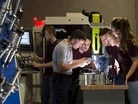Labour shortage: Over 2mn manufacturing jobs at risk by 2030

2,100,000 - that’s the number of manufacturing jobs projected to be vacant by 2030, according to recent research by Deloitte. This labour shortage is fueled by Baby Boomers leaving the workforce faster than new people enter the industry. Call it what you will, the “Great Resignation,” “Silver Tsunami,” or the next buzzword; the fact is, the exit door at most factories is getting much more use than the entrance.
Even more alarming, those leaving the workforce are seasoned, skilled workers who stayed in their jobs for decades. Those entering the workforce are less skilled, less experienced, and less likely to remain in the position for more than a few years. As these skilled workers leave, they take with them decades of on-the-job insights, also known as tribal knowledge, creating a severe skill gap.
What is Tribal Knowledge?
Tribal knowledge is information about a business’s products or processes stored only in employees' minds. In manufacturing, this can be knowledge about how to fix machinery, efficient workarounds, or infrequent processes, all of which have been left undocumented.
The following will be all too familiar for many manufacturers: A machine breaks. Everyone looks for Joe; he always knows how to fix it. He’s the machine whisperer. And then it hits you: Joe retired. He’s not coming back. No one knows how to fix it. The machine staying down will cost you money, orders won’t get shipped on time, and you’ll hear about this from corporate, the customer, or both.
The challenges of Tribal Knowledge
Manufacturers have been placing pressure on seasoned workers to delay retirement, knowing that their exodus means the loss of business-critical tribal knowledge. However, manufacturers cannot delay the inevitable forever.
Ultimately, relying on tribal knowledge is a symptom of a larger problem. It’s a remnant of old ways of working in which manufacturers relied on gut instincts rather than data to drive decision-making.
It’s easy to feel nostalgia for the good old days when times were simpler, and workers stayed in their jobs for decades instead of the two years and three months that Gen Z averages. But times have changed.
For manufacturers to remain competitive, they must adapt, look ahead, and embrace the technology that will define the future rather than reminisce about the past.
Three ways technology can help
Nearly every manufacturing company, regardless of size, is working towards becoming data-driven. Usually, this stems from a desire for greater productivity, efficiency, and margins. However, one overlooked benefit of adopting advanced technology is how it can help capture tribal knowledge.
Digitise and document processes
By digitising previously manual processes, manufacturers can document processes that were only known through trial and error. Taking a bottom-up approach that values the collective input of those on the shop floor, manufacturers can crowd-source tribal knowledge and import processes into best-practice software solutions. Then, these processes can be visualised, analysed, and optimised to teach new workers digitally, which is how Gen Z is accustomed to learning.
Machine learning
Digitisation and documentation won’t completely solve the labour shortage. Luckily, that’s where a more well-known benefit of smart manufacturing comes in: machine learning. Two years and three months, the average tenure of Gen Z workers, is not enough time for humans to develop deep tribal knowledge. However, it’s more than enough time for machine learning to analyse and improve upon documented and digitised processes. Depending on the process, this may also pave the way for increased automation, helping ease the pains of labour shortages.
Predictive maintenance
Manufacturers often feel the loss of tribal knowledge most strongly when something goes wrong, such as a machine breaking. But what if you could keep machines from breaking down in the first place? As the saying goes, “An ounce of prevention is worth a pound of cure.” The future of manufacturing looks less like relying on workers with decades of experience to find a workaround and more like keeping machines from breaking in the first place by leveraging data for predictive maintenance.
Implementing new technology in manufacturing
Each day, companies embrace smart manufacturing for its numerous benefits, including addressing the challenges of tribal knowledge. However, this is a process that takes time to happen. In most cases, it’s not something manufacturers do independently as they lack in-house technology expertise.
Therefore, they rely on outside experts to partner with them as they embark on their modernisation journey. One of the keys to making this journey successful is breaking the implementation into short sprints that generate ROI quickly while minimising disruptions to operations. The best partners will provide a clear roadmap for early wins and be more focused on solving problems and creating value than selling features.

